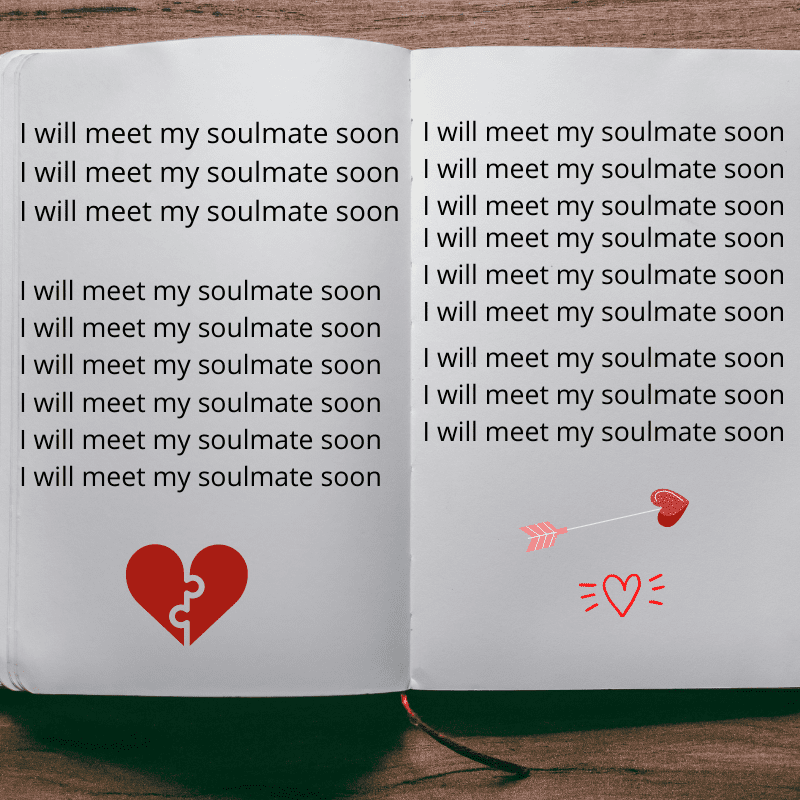Last Updated on December 22, 2024 by Jen
If you are interested in your dreams, then a dream journal is a must. Dreams are often a reflection of your subconscious, and by writing down your dreams in a dream journal, you can keep track of what your subconscious is trying to tell you and use the information to your advantage in your waking life.

A Dream Journal Helps You To Become Better At Remembering Your Dreams
I have a friend who used to say he didn’t dream until he started a dream journal. Going to bed with the intent to write down his dreams in the morning encouraged him to remember his dreams as soon as he woke up. And he soon realized that he was actually having magical and interesting dreams.
Just like anything else, the more you practice remembering your dreams, the better you become.
Getting a dream journal and intending to use it is the first step in remembering your dreams better.
The second and third steps? Going to bed every night with the intention to remember your dreams and waking up every morning with your dream journal nearby.
The last step? Picking up your dream journal and writing everything you remember down (even if it’s just a word or a feeling) in your dream journal.
Soon you will be remembering whole dreams and even multiple dreams in complete clarity.
A Dream Journal Helps You Gain Clarity On Issues In Your Life
Recurring dreams often result from issues that keep occurring in your life or that you have not dealt with yet. These could include past hurts, fears, problems, unmet needs, and worries that you are having.
For example, I often have a dream where I am working at an old job and I’m desperately trying to get paid. In my dream, I’ve failed at my current job, and I’ve gone back to a job I hate. I know that they have withheld money from me and I’m trying to get it paid out to me, even though nobody will listen to me. All the managers that I didn’t like are there. They all treat me with disrespect and annoyance. I feel like a nuisance. I feel desperate. I feel like a failure.
Because of my dream journal, I know that this exact dream happens when I’m feeling insecure in my current line of work. It’s a signal that I’m feeling like a failure and would be willing to go back to something I hate because I feel like I can’t do what I love.
But sometimes you have a one-off dream that involves an issue you didn’t even know you had. You may have never had the dream before, but it’s clear that it’s trying to send you a message about something that is currently happening in your life.
A Dream Journal Helps You Gain Insight Into How To Solve Issues You Are Having
Sometimes dreams help you uncover issues you are having, but sometimes they give you answers.
This is why a dream journal is important. If you only go through the dream in your head – and avoid writing it down in a dream journal, you may miss important details that lead to an answer you’ve been looking for.
With a dream journal, you can write down everything from your dream and start to piece it together to make sense.
For instance, if you are struggling in your relationship and you dream about the problems you’ve had with an ex, that you had completely forgot about, your subconscious may be trying to tell you that you’ve carried some issues into your current relationship. It could also be telling you that you’ve carried some bad relationship habits into your current relationship or that you are dating someone extremely similar to your ex and things probably won’t work out no matter how hard you try. The more of your dream you recall and record, the more likely it is you will be able to figure out what the exact meaning of the dream is.
A Dream Journal Helps You Find Your Dream Symbols
The more you record your dreams each morning, the more you will recognize your dream symbols.
While you can find many dream dictionaries online and offline, dream symbols are actually personal to you.
For instance, some dream dictionaries say that a red rose indicates passion, a thriving love life, and lusty feelings, which are pretty positive. But, for you, a red rose may have a negative connotation. It may make you remember your ex who gave you a red rose just before he or she broke up with you. It may represent loss and pain to you.
This is why keeping a dream journal is important. As you write down everything you remember, you are more likely to recall these little symbols in your dream and, by using the context of the dream, use them to help you interpret your dream.
What To Include In Your Dream Journal

A dream journal should include things like:
- The details of what happened in the dream.
- How you felt in the dream. Were you happy, sad, excited, scared, or something else?
- Where were you in the dream? Home? Work? Somewhere you don’t recognize? Describe where you were.
- What was the theme of your dream? Was it a celebration or something more relaxed or mundane?
- What were the other people in the dream doing? Knowing that you often control your dream characters (or your subconscious does), writing down what they were doing could help you gain meaning out of your dream. What were you making them do? Who were you making them be?
- Did you notice any dream symbols in your dream? What were they? For example, was there water everywhere? What does water mean to you?
- Who were YOU in the dream? Sometimes you are not yourself. Sometimes you are of the opposite sex in your dream. Sometimes you are someone else that you know or don’t know.
By recording all these things in your dream journal, and then putting them together, you will find it much easier to interpret your dreams and find value in them.
What’s Going On In Your Waking Life?
Another thing you need to pay attention to is what is going on in your waking life – when you are not asleep.
Your dreams often hold answers and insights into your waking life, and you need to be aware of what’s happening so that you can use those answers and insights.
For instance, if you are working at a job you hate, but you seldom admit it to yourself, your dreams may be trying to tell you to find another job or even what kind of job you should look for. They might be giving you clues on how to enjoy your job more. Or they might be helping you work through issues that you are having at your job. By keeping a detailed dream journal, and being aware of your issues at work, you will be much more likely to find insights and solutions to the problem you are having so that you can be happier.
After all, you want yourself to be happy. And you are in control of your dreams. So, get your dream journal, take notes, and work with your dreaming self to come up with ways to be happier in life.
Identifying Patterns in Dreams and Their Symbolism
When you keep a consistent dream journal, you may begin to notice recurring themes, symbols, or emotions that appear over time. Identifying these patterns is crucial to unlocking deeper meanings within your dreams.
For instance, you might repeatedly dream about being chased, flying, or encountering specific places or people. These patterns might symbolize underlying fears, desires, or unresolved issues in your waking life.
To identify patterns, review your dream journal regularly and highlight recurring elements. Pay attention to common threads, such as specific colors, animals, or scenarios. Ask yourself what these elements might represent to you personally or within your current life circumstances.
For example, dreaming of water often can symbolize emotions, while recurring dreams of being lost might suggest feelings of uncertainty or lack of direction.
Over time, these patterns may reveal insights about your subconscious mind, offering clues about areas in your life that need attention or growth. By reflecting on the symbolism of these patterns and connecting them to your waking life experiences, you can gain a deeper understanding of yourself and your emotions.
Common Dream Symbols and Their Interpretations
Dream symbols, such as animals, objects, and locations, often carry deep meanings that can vary significantly from person to person. These symbols serve as a bridge between the subconscious mind and waking life, revealing aspects of ourselves that may otherwise remain hidden. The interpretation of these symbols depends on personal experiences, emotional associations, and even cultural backgrounds.
Animals
Animals are frequent symbols in dreams, often representing instinctive feelings, behaviors, or traits. For example, a snake might symbolize transformation or personal growth, as it sheds its skin, but it could also represent fear or danger depending on the dreamer’s experience with or perception of snakes.
Similarly, dreaming of a dog might signify loyalty, protection, or companionship, while for someone with negative experiences involving dogs, the same symbol could evoke feelings of anxiety or mistrust.
Cultural influences also play a role—some cultures view certain animals as sacred, positively influencing their symbolic meanings, while others might associate the same animals with negative connotations.
Objects
Objects in dreams can carry practical or emotional resonance. A mirror, for instance, might symbolize self-reflection or a desire to understand your true self. However, a broken mirror might provoke anxiety, representing insecurity or fear of bad luck, particularly in cultures that associate broken mirrors with misfortune.
Everyday objects, like keys, might signify opportunities or unlocking solutions to problems, while personal attachments to specific objects can shape their meanings in a dream.
Locations
The locations in your dreams often reflect psychological states or areas of focus in your life. A familiar childhood home might symbolize a longing for safety or a need to revisit past issues, while an unknown, mysterious place might represent uncertainty or unexplored aspects of yourself.
Common locations, like schools, often point toward themes of learning or self-improvement, whereas natural settings, such as forests or oceans, might symbolize personal growth or emotional depth.
Cultural and personal context will also influence meaning; for instance, someone raised by the sea might attach entirely different feelings toward dreaming of the ocean compared to someone who fears water.
Ultimately, dream symbols are not universal—they are deeply tied to the dreamer’s personal narrative and cultural lens. To uncover their meanings, consider your emotional reactions and experiences with these symbols both in your waking life and within the dream itself. Taking time to analyze how a particular symbol resonates within the layers of your personal and cultural context can lead to profound insights into your subconscious mind and emotional well-being.
Lucid Dreaming And Dream Journals
Keeping a dream journal is an essential practice for those seeking to experience lucid dreaming. By recording dreams immediately upon waking, you become more familiar with your dream patterns, symbols, and recurring themes, which enhances your awareness when dreaming. This process of reflection can help you recognize when you are in a dream state, a key step toward achieving lucidity. Furthermore, dream journals act as a tool for identifying “dream signs”—unique cues that can alert you to the fact that you are dreaming.
Lucid dreaming offers significant potential for self-exploration and problem-solving. When aware of your dream state, you can actively engage with scenarios, confront fears, or interact with symbolic figures in your subconscious. This can lead to personal growth and improved emotional well-being. Many individuals use lucid dreaming to rehearse real-life situations, explore creative ideas, or gain new perspectives on challenges. By blending conscious awareness with the freedom of dreaming, lucid dreaming becomes a powerful tool for unlocking the mind’s potential.
Tips For Better Dream Recall
Improving dream recall is a crucial step toward understanding your subconscious and deepening your awareness of dreams. Here are some practical tips to enhance your ability to remember your dreams:
- Keep a Dream Journal by Your Bedside: Always have a notebook or journal within easy reach to record your dreams as soon as you wake up. Writing down even small fragments or feelings can help you capture important details that may fade quickly.
- Write Immediately Upon Waking: Dreams are often fleeting, and their details can slip away within minutes of waking. Train yourself to stay still for a moment after waking to recall and jot down as much as you can before getting out of bed.
- Set an Intention Before Sleeping: Mentally affirm your desire to remember your dreams before you fall asleep. This simple practice can align your subconscious mind toward prioritizing dream recall.
- Minimize Distractions Upon Waking: Avoid jumping to your phone, turning on bright lights, or engaging with other distractions right after waking. These actions can disrupt your connection to the dream memories.
- Practice Mindfulness and Relaxation Before Bed: Regular mindfulness exercises, such as meditation or deep breathing, can help quiet your mind and create a stronger connection to your inner thoughts. A relaxed state before bed can contribute to more vivid and memorable dreams.
- Align Your Sleep Schedule: Consistent sleep patterns and ensuring you get enough rest enhance the likelihood of vivid dreaming. The REM stage of sleep, where dreaming occurs most vividly, is more accessible during uninterrupted and high-quality sleep cycles.
By integrating these habits into your routine, you can strengthen your dreaming and recall abilities, offering new insights into your inner self.
Dreams and Emotional Healing
If you want to engage in healing, keeping a dream journal can help. Dreams play a pivotal role in emotional processing and psychological healing. During sleep, particularly in REM stages, the brain revisits emotions and experiences in a safe and detached environment, allowing individuals to confront unresolved feelings or past traumas. This process can help reduce the intensity of painful memories, creating space for understanding and acceptance.
Dreams often serve as a bridge between conscious and subconscious thoughts, presenting symbols or narratives that reveal hidden fears or desires. By engaging with these dream elements, individuals may gain clarity or even find closure on deeply rooted issues.
The therapeutic potential of dreaming lies in its ability to simulate challenging scenarios, fostering emotional resilience and aiding in coping with life’s complexities, making it an invaluable tool for mental well-being.
Dreaming as a Creative Tool
Keeping a dream journal and actively exploring the symbolism within can also be a powerful tool for creative self-expression. The surreal nature of dreams allows for a break from conventional thought patterns, opening doors to unique ideas and perspectives.
Artists throughout history have used their dreams as inspiration, from Salvador Dali’s iconic melting clocks to Mary Shelley’s Frankenstein. By tapping into this wellspring of imagination, individuals can channel their subconscious thoughts into various art forms, leading to self-discovery and personal growth.




